Film adaptations are notoriously tricky to get right, especially anime films coming to live-action. With many titles (like Netflix’s upcoming Cowboy Bebop) coming to our screens soon, let’s look at what it takes to get something like that right and why past anime live-action adaptations have failed so miserably, both at the box office and from an adaptation and storytelling perspective.

A common counter-argument I hear to this problem is “just get creatives who are fans to make it, there’s enough of them” and yes, that is true that there are a lot of very creative fans, that’s not how Hollywood is run. Do you think Lionsgate really cares about how accurate their portrayal of Naruto is when the fans will buy tickets out of curiosity either way? Spoiler alert: they really don’t care as long as many people as possible are buying tickets. Adaptations are a tricky beast, and when they’re right they hit so well…but when they’re not, it’s a dismal and disappointing sight, especially for fans of the original source material. How can anyone be expected to live up to the worlds and characters that already exist in a million different forms inside the heads of a million different fans? It’s a tall order.
Studios want established names directing something with an existing fan base especially, mostly for the fact that they’re investing a lot of money in this project, and they want to pull as many people into a “genre movie” as possible. The best example of this is M. Night Shyamalan’s The Last Airbender: the source material guaranteed the ticket purchases from fans of the Avatar series, however, how else could the studios attract action fans and those who did not grow up with the series? Easy: put a common household film name on it and bill it as an M. Night Shyamalan film. Is it a great, or even good, strategy? No. However, it keeps happening, because studios like the safe bet. Even if it’s horrible, people will buy a ticket out of curiosity.


While some fan films get a lot of things right and it’s tempting to tell studios to hand over popular franchises to fan directors and content creators…it’s not been done before because it’s a bad idea. As a member of the “media generation”, it’s easy to forget exactly how easy it is to create and distribute whatever we want – including fan films. However, fan films are not on the same level behind the scenes as Hollywood features – not even the best ones. It’s the equivalent of asking a publisher to read your fan fiction and expecting them to sign you and immediately become the next Steven King; that’s just not how the system works. The studios operate on resume – meaning they want to see all the properly funded, real, professionally run projects you’ve created – not just the stories you pick to tell that aren’t held liable to any sort of studio, board of investors, or anyone. In this industry, it’s a lot of “how easy are you to work with and what demographic can you bring in” as opposed to only who can tell the best story or make the best film.
That said, let’s look at when a fan film did better than the official adaptation. Netflix’s 2017 Death Note film left a bitter taste in many viewer’s minds: in their attempts to make it more appealing to American audiences, it whitewashed the entire story, scrubbing it of the source’s Japanese culture and references. Not to say the 2006 Japanese film adaptation series got everything right…but they did do it better. However, since Hollywood is obsessed with remaking films their way, there are fans who have noticed this and actively sought to counteract some of Hollywood’s adaptation problems, like whitewashing. The best example I can find of this is in a YouTube fan film by Re:Anime, a channel that takes mostly anime fight sequences and adapts them as live-action. True, it’s not nearly as polished as the big-budget films, but it feels a lot more true to the source in this case.
Why is that? Easy: it’s because the fan film creators aren’t beholden to Hollywood studios and executives demanding that they make changes in order for this film to be a success. Fewer cooks in the kitchen means less interference in the director’s overall vision. And when the director is a fan with high standards taking a lot of care to make things true to the source, it shows. But at the end of the day, unless the fan director happens to be someone like Kevin Smith who the studios are willing to hand millions of dollars to in return for a film that will make them three times more than that back…the adaptations will continue to be handed to directors and creators who are already known and the studios are comfortable betting on.
Enjoyed this article? Share it!
This article is auto-generated by Algorithm Source: bleedingcool.com


